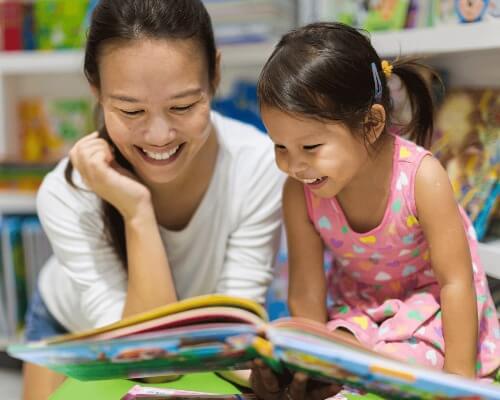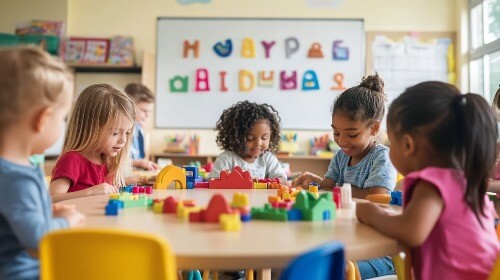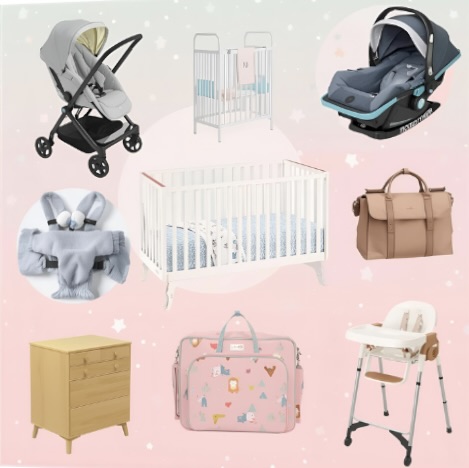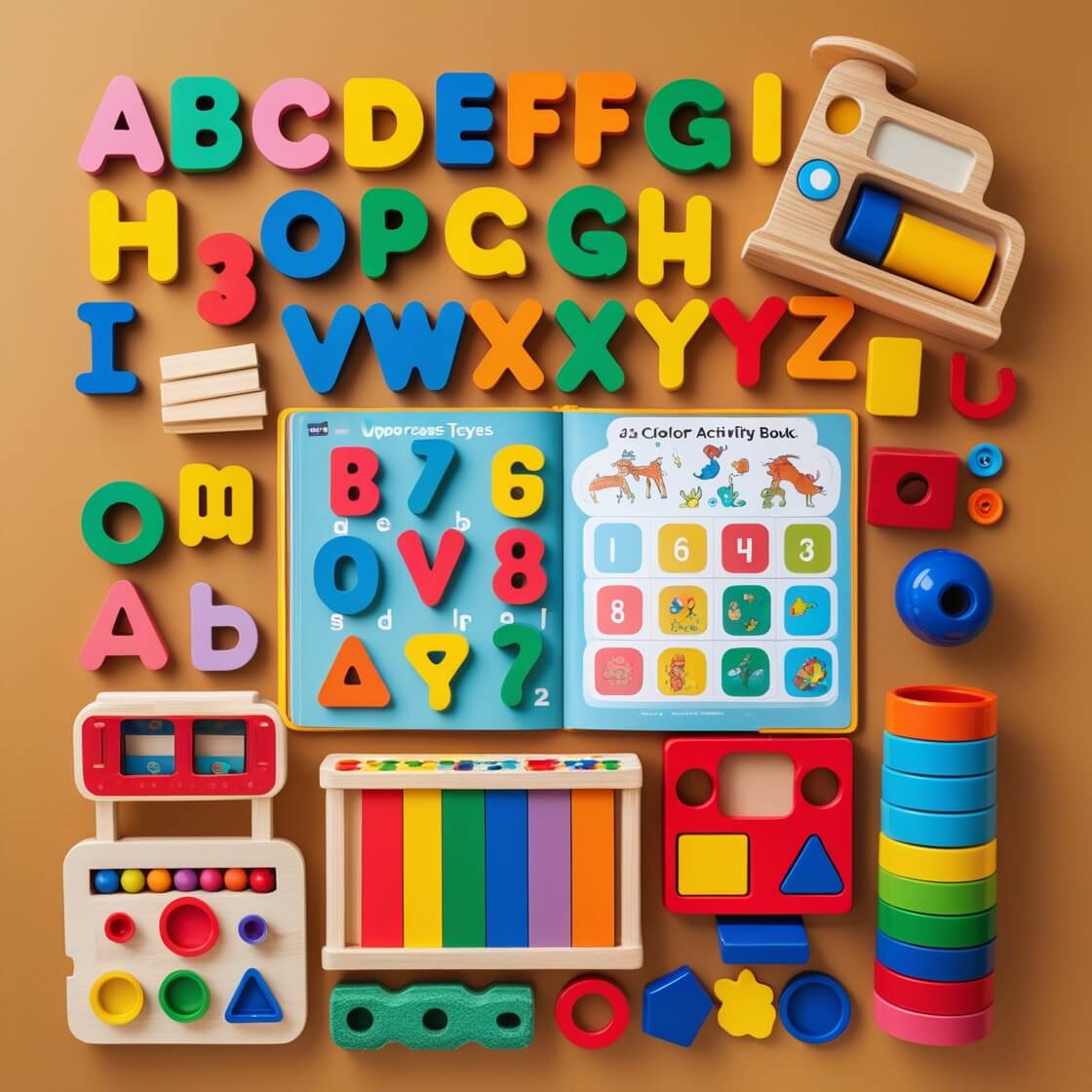When Do Kids Start Preschool? Benefits and Choosing the Right Preschool
The Big Question: "When do kids start preschool?"
The short answer? It depends! Typically, kids start preschool between the ages of 3 and 5. But here's the thing - there's no one-size-fits-all answer. Every child is unique, and so is every family's situation.
Let's break it down a bit:
 A class of preschoolers sitting on the floor with colourful material around them and they are all smiling.
A class of preschoolers sitting on the floor with colourful material around them and they are all smiling.Age Ranges for Preschool
Developmental Readiness:
- Some programs accept children as young as 2.5 years old
- Many preschools have programs specific age requirements often starting at 3-year-olds
- Some pre-K programs are designed for 4-year-olds
- Some children will start at 5, especially if their birthdays fall close to the cutoff date for kindergarten
Preschool Programs:
- Most programs have specific age requirements, often starting at 3 years old.
State and Local Guidelines:
- Check the regulations in your area, as these can influence the starting age.
Remember, the question of when do kids start preschool isn't just about age. It's about readiness, and that's something only you can gauge for your child.
Is My Child Ready for Preschool?
Deciding when to start preschool depends largely on your child’s readiness.
Here are some signs that your child may be ready:
- They are becoming more independent: Do they handle basic self-care tasks like using the bathroom, washing hands, and eating snacks independently?
- They can follow simple instructions: Is your child able to express their needs and understand simple instructions?
- They're showing interest in learning and playing with other kids: Does your child interact with other children? Sharing, taking turns, and playing together are key skills.
- Separation: Are they comfortable being away from you for a few hours? This can be a big hurdle for some kids.
- Potty Trained: Is your child potty trained (although some preschools are flexible on this)
Don't worry if your child isn't ticking all these boxes yet. Every child develops at their own pace, and that's perfectly okay!
 Mom and her daughter are joyfully reading a picture book together.
Mom and her daughter are joyfully reading a picture book together.Types of Preschool Programs
When considering when do kids start preschool, it's important to know that there are different types of programs available.
Here are a few common ones:
- Half-day programs: These typically run for 2-3 hours in the morning or afternoon. They're great for easing kids into the preschool routine.
- Full-day programs: These run for about 6-7 hours, similar to a regular school day. They're ideal for working parents or kids who need more structure.
- Part-week programs: Some preschools offer 2-3 day options, which can be a good starting point for younger children.
- Montessori programs: These focus on self-directed learning and hands-on experiences.
- Play-based programs: These emphasize learning through play and social interaction.
Benefits of Starting Preschool
Starting preschool has many benefits for children:
- Social Development: Preschool helps kids learn how to interact with peers and adults in a structured setting.
- Cognitive Growth: Early exposure to learning activities fosters cognitive skills like counting, letter recognition, and problem-solving.
- Routine and Structure for Kindergarten: Preschool introduces children to routines, which can make the transition to kindergarten smoother.
- Emotional Development: Kids learn to manage emotions, practice patience, and build confidence.
However, keep in mind that there are some factors that you will need to consider before making your final decision to allow your little one to start preschool.
- Your child's temperament: Is your little one outgoing or shy? Adaptable or routine-oriented?
- Your family's schedule: Do you need full-day care, or would a part-time program work better?
- Your child's interests: Some preschools focus more on arts, others on outdoor activities. What would your child enjoy most?
- Your budget: Preschool costs can vary widely. Look into options that fit your financial situation.
- Location: Consider preschools that are conveniently located for drop-offs and pick-ups.
 Kids sitting around a table at preschool, with educational toys.
Kids sitting around a table at preschool, with educational toys.What If My Child Isn’t Ready?
If you feel your child isn’t quite ready for preschool, that’s okay! Every child develops at their own pace.
Here are some alternatives:
- Playgroups: Less formal than preschool, playgroups allow kids to socialize and learn in a relaxed environment.
- Stay-at-Home Learning: You can engage your child in educational activities at home to prepare them for future schooling.
- Delay Enrollment: It’s perfectly fine to wait until your child is older. Many kids benefit from an extra year at home.
How to Choose the Right Preschool
Selecting the right preschool can feel overwhelming, but focusing on a few key aspects can help:
- Curriculum: Look for a program that matches your educational philosophy, whether it’s play-based, academic-focused, or Montessori-style.
- Teacher Qualifications: Experienced, nurturing teachers make a huge difference in your child’s experience.
- Class Size: Smaller classes often mean more individual attention for your child.
- Location and Schedule: Consider the convenience of the preschool’s location and whether the schedule fits your family’s needs.
Preparing Your Child for Preschool
Once you’ve decided when your child is ready to start, preparation is key:
- Visit the Preschool: Many schools offer orientation days. Take advantage of these to familiarize your child with the new environment. This will help to ease those first day jitters.
- Talk About Preschool: Discuss what they can expect, focusing on the fun aspects like making friends and learning new things. Share your own fun school memories or read books about starting school.
- Practice Independence: Encourage self-help skills at home, like dressing themselves and managing personal belongings.
- Establish Routines: Start a morning routine similar to what they’ll have during preschool to help them adjust.
- Arrange playdates: Help your child get used to being around other kids.
Addressing Common Concerns
Many parents have concerns about their child starting preschool.
 Small boy holding his head up with hands and squinting while smiling a huge smile.
Small boy holding his head up with hands and squinting while smiling a huge smile.Let’s address some common ones:
- Separation Anxiety: It’s natural for both parents and kids to feel anxious. A gradual transition, like staying for a short time on the first day, can help. Try to linger less each day.
- Health and Safety: Ensure the preschool follows strict health protocols, especially in light of recent global health concerns.
- Academic Pressure: Remember that preschool should be about exploration and fun. Academic skills will come naturally through play and interaction.
- New friends and skills: Get ready for lots of stories about new pals and exciting things they're learning!
When Do Kids Start Preschool? A Personal Perspective
Every family’s journey is unique. For some, starting at age 3 feels right; for others, waiting until 4 or even 5 is the best choice. Trust your instincts and know that there’s no "perfect" age.
Deciding when do kids start preschool is a personal choice that depends on your child’s readiness, your family’s needs, and the options available in your area.
Remember, there’s no rush—your child will thrive when the time is right for them.



























New! Comments
Have your say about what you just read! Leave me a comment in the box below.